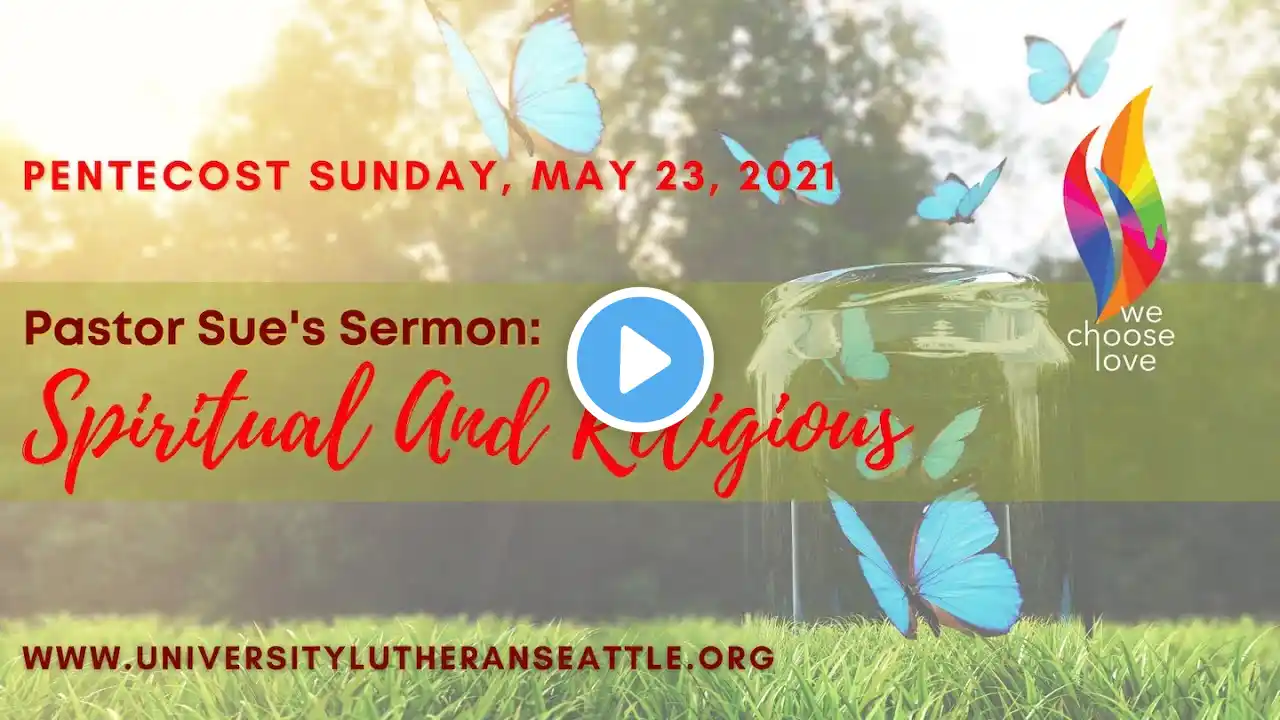
ULC Sermon for Pentecost Sunday, May 23, 2021 - Spiritual and Religious
Spiritual And Religious Sermon for Pentecost Sunday, May 23, 2021 Pastor Susan Schneider University Lutheran Church, Seattle © 2021 UniversityLutheranSeattle.org Perhaps no phrase has shaped our collective experience of recent history as this one: “I can’t breathe.” Those were the heart-rending words uttered by George Floyd as he died just over a year ago. And, across the nation—across the world—they are the words of millions of other people who gasped some variation of them while struggling with COVID 19. “I can’t breathe” is also the soundless cry from a valley full of dry bones in today’s reading from Ezekiel. Though the place where he was led by the Spirit is not identified, there were many bones there, and the bones were very dry. Perhaps the place was a battlefield, where bodies were left in unburied heaps, exposed to the ravages of wild animals and the weather. After Ezekiel prophesies to the bones, he is told that they represent “the whole house of Israel,” not just soldiers killed in battle. Ezekiel knows about “the whole house of Israel,” he’s been preaching to them for a long time—not as bones, but as God’s people in exile in Babylon. They have been behaving in increasingly unfaithful and unhealthy ways. Their excuse for turning away from God is this: “Our bones are dried up, our hope is lost, we are clean cut off.” Many are angry with God (and everyone else) for their hardship. Many missed loved ones back in Jerusalem, or missed having a social and religious space for gathering. Maybe this past year and a half enables us to understand a little of what forced separation and the struggle to remain faithful to God in the midst of a crisis involves. In any case, it makes sense to me that Ezekiel is speaking to a crowd who may be technically alive, but who are, in fact, whispering or screaming or praying, “I can’t breathe!” And I’m guessing I’m not the only one who can relate to their agony. Ezekiel has one message for those who are barely breathing: God has not abandoned you. God is as close to you as your next breath. (Pause, breathe). In just fourteen verses, this passage uses the Hebrew word ruach nine times. It is variously translated as “breath” (verses 5, 6, 8, 10), “wind” (verse 9) and God’s own Spirit (14), but it looses some metaphorical oomph if we try to neatly differentiate between the meanings. Whether it is a breath or a wind, it is God who sends this life giving force to revive God’s people. There is an echo of those rattling bones in both of today’s readings from the New Testament. Both John’s and Luke’s versions of the Easter story depict the disciples being visited by Jesus more than once after his resurrection. During the last of those times Jesus announces that he is ascending into heaven, but promises that they will receive a different companion—the Paraclete. Often that name is translated as “The Advocate,” and indeed, one of the activities of the Holy Spirit is to intercede for people “with sighs too deep for words to express.” But the Holy Spirit is also much more. If you look at the different verbs for what the Holy Spirit is up to in this Gospel lesson, you will see that the Paraclete not only advocates, but also guides, announces, gives glory to God, reveals, fills, and empowers. In other words, the Holy Spirit brings the fire! But the disciples are not looking forward to meeting their new companion. They miss Jesus whom they knew and loved. They have no sense of what their future will hold. But Jesus asked them to go back to Jerusalem together and wait. So they do. Here’s the important thing that both the disciples and Ezekiel do: without understanding God’s commands at all, they show up and do what God asks them to do. In Ezekiel’s case, preaching to dry bones—surely as pointless a task as anyone can imagine—and in the case of the disciples—waiting—obviously the hardest task anyone can be given. But they do it. [Sermon text continued in Comments below...]
